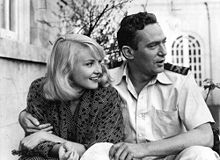Peter Finch
[1][2] Born in London, he emigrated to Australia at the age of ten and was raised in Sydney, where he worked in vaudeville and radio before becoming a star of Australian films.
[3] Joining the Old Vic Company after World War II, he achieved widespread critical success in Britain for both stage and screen performances.
[7] However, Peter only learned in his mid-40s that Wentworth Edward Dallas "Jock" Campbell, an Indian Army officer, not George Finch, was his biological father.
[7] George gained custody of Peter, who was taken from his biological mother and raised by his adoptive paternal grandmother, Laura Finch (formerly Black), in Vaucresson, France.
In 1925 Laura took Peter with her to Adyar, a theosophical community near Madras, India, for a number of months, and the young boy lived for a time in a Buddhist monastery.
He also worked as a sideshow spruiker at the Sydney Royal Easter Show, in vaudeville with Joe Cody and as a foil to American comedian Bert le Blanc.
He later starred with Neva Carr Glyn in an enormously popular series by Max Afford as husband-and-wife detectives Jeffery and Elizabeth Blackburn as well as other ABC radio plays.
He appeared in a number of propaganda shorts, including Another Threshold (1942), These Stars Are Mine (1943), While There is Still Time (1943) and South West Pacific (1943), the latter for Ken G. Hall.
Finch produced and performed Army Concert Party work, and in 1945 toured bases and hospitals with two Terence Rattigan plays he directed, French Without Tears and While the Sun Shines.
[19][20] Finch continued to appear in the (rare) Australian feature films made around this time including A Son Is Born (1946) and Eureka Stockade (1949).
Harry Watt arranged for a screen test at Ealing Studios, which led to Finch being cast as a murderous actor in the movie Train of Events (1949) under the direction of Basil Dearden.
[21][22] While making the film, Olivier cast Finch as a Pole in a stage play at The Old Vic, James Bridie's Daphne Laureola (1949) supporting Edith Evans.
[23] When Train of Events was released, critic C. A. Lejeune praised Finch's work in the London Observer, commenting that he "adds good cheekbones to a quick intelligence and is likely to become a cult, I fear.
Finch's film career received a considerable boost when cast as the Sheriff of Nottingham in The Story of Robin Hood (1952) for Walt Disney, opposite Richard Todd.
In 1952 Finch performed at St James's Theatre, King Street, London, in Sir Laurence Olivier's and Gilbert Miller's The Happy Time a comedy by Samuel Taylor.
In The Story of Gilbert and Sullivan (1953) Finch played Richard D'Oyly Carte opposite Robert Morley and Maurice Evans in the lead; the resulting movie was a box office disappointment.
Finch returned to the stage at the Old Vic with an appearance in An Italian Straw Hat by Eugène Labiche and Marc Michel adapted by Thomas Walton.
The part was intended for Laurence Olivier who turned it down, but Vivien Leigh agreed to play the female lead; Dana Andrews was the other star.
Back in England, Finch was cast as the villain Flambeau in Father Brown (1954), receiving superb reviews opposite Alec Guinness in the title role.
He narrated a documentary The Queen in Australia and had his first real star part in the Group 3/British Lion comedy, Make Me an Offer (1954), playing an antiques dealer.
Scrimgeour of Associated TV wanted Finch to play a patrol officer in a film based on Colin Simpson's articles about Shangri-La Valley in New Guinea.
Finch was then cast as an Australian soldier in A Town Like Alice (1956), opposite Virginia McKenna under the direction of Jack Lee from the novel by Neville Shute.
The World War II drama, mostly set in Malaya and almost entirely shot at Pinewood Studios, became the third-most-popular film at the British box office in 1956 and won Finch a BAFTA for Best Actor.
[39] Finch returned to Australia to make The Shiralee (1957), made for Ealing Studios and MGM from the novel by D'Arcy Niland, under the direction of Leslie Norman.
Finch followed it with another Australian story filmed on location, the bushranger tale Robbery Under Arms (1957), which did less well, despite having the same producer and director as A Town Like Alice.
[41] For Disney he played Alan Breck in a version of Kidnapped (1960) then went to Hollywood to make The Sins of Rachel Cade (shot in 1959, released in 1961), an attempt to repeat the success of The Nun's Story, with Angie Dickinson.
Finch was originally chosen to play Julius Caesar in Cleopatra (1963) opposite Elizabeth Taylor, and filmed some scenes in London, under the direction of Robert Mamoulian.
When the film was postponed Finch withdrew; new director Joseph Mankiewicz wanted to still use him, but the actor was unable to make his schedule work, and the role was recast with Rex Harrison.
Finch's next three films saw him support high-profile female stars: Sophia Loren in Judith (1966), Melina Mercouri in 10:30 P.M. Summer (1966) and Julie Christie in Far from the Madding Crowd (1967).
Finch was asked to audition for the part of news presenter Howard Beale in Network (1976), written by Paddy Chayefsky and directed by Sidney Lumet.
